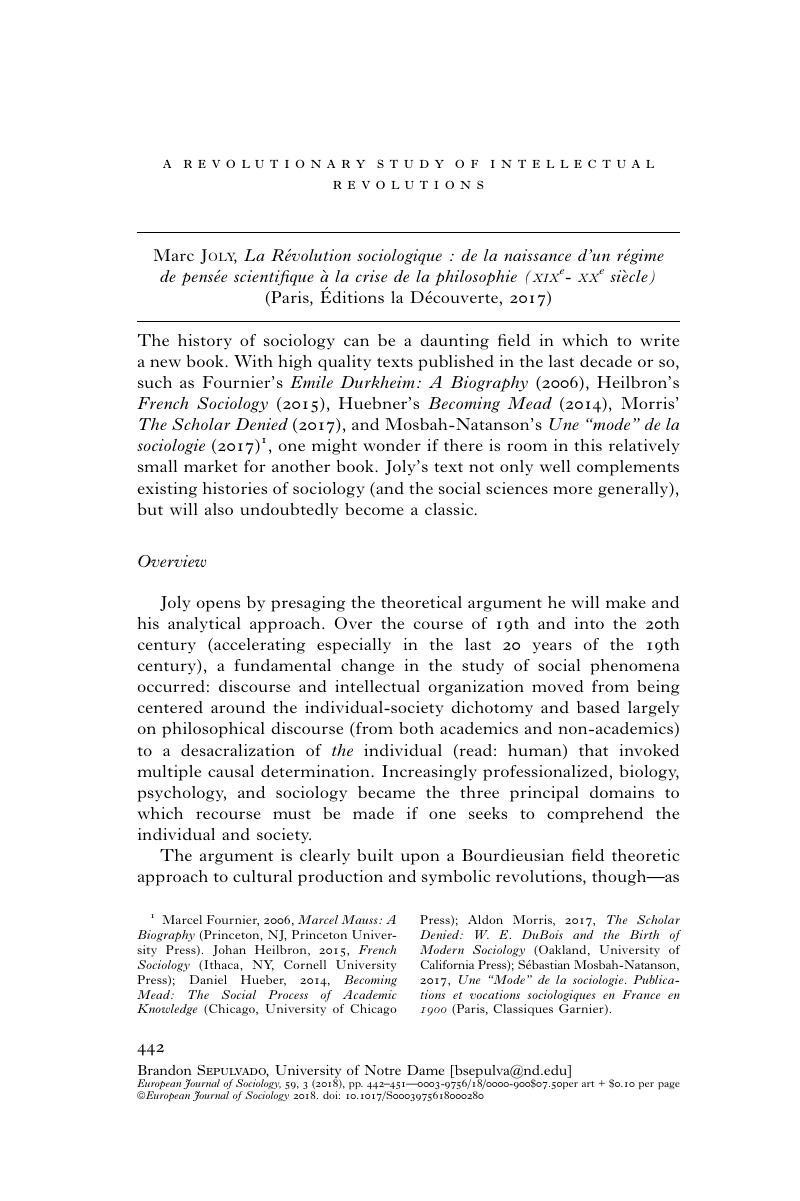No CrossRef data available.
Article contents
A Revolutionary Study of Intellectual Revolutions - Marc Joly, La Révolution sociologique : de la naissance d’un régime de pensée scientifique à la crise de la philosophie (xixe- xxe siècle) (Paris, Éditions la Découverte, 2017)
Published online by Cambridge University Press: 31 January 2019
Abstract

- Type
- Book Reviews
- Information
- European Journal of Sociology / Archives Européennes de Sociologie , Volume 59 , Issue 3 , December 2018 , pp. 442 - 451
- Copyright
- Copyright © A.E.S. 2018
References
1 Marcel Fournier, 2006, Marcel Mauss: A Biography (Princeton, NJ, Princeton University Press). Johan Heilbron, 2015, French Sociology (Ithaca, NY, Cornell University Press); Daniel Hueber, 2014, Becoming Mead: The Social Process of Academic Knowledge (Chicago, University of Chicago Press); Aldon Morris, 2017, The Scholar Denied: W. E. DuBois and the Birth of Modern Sociology (Oakland, University of California Press); Sébastian Mosbah-Natanson, 2017, Une “Mode” de la sociologie. Publications et vocations sociologiques en France en 1900 (Paris, Classiques Garnier).
2 One should note, however, that factors outside of France certainly pertain to the discussion herein. Joly is quick to note that the symbolic revolution effected during the 19th century (and into the 20th century) was transnational. Nonetheless, such influences interacted with professional and intellectual factors within France in a unique manner that can only be understood by taking into account this national context.
3 I leave to the reader’s judgement whether the inclusion of this additional material would have unnecessarily extended the book. After all, much of my critique applies only because Joly made such a sustained and comprehensive argument.
4 Pierre Bourdieu, 2013, “L’effet Manet : cours au Collège de France (1998-2000),” in P. Casanova, P. Champagne, C. Charle, F. Poupeau and M.-C. Rivière, eds, Manet: une révolution symbolique (Paris: Raisons d’Agir/Seuil: 11-559).
5 Ibid.
6 Pierre Bourdieu, 1971, “Une interprétation de la théorie de la religion selon Max Weber,” Archives Européennes de Sociologie, 12(1): 3-21; P. Bourdieu, 1991, “Genesis and Structure of the Religious Field,” Comparative Social Research, 13: 1-44; Pierre Bourdieu and Roger Chartier, 2015, The Sociologist & The Historian (Malden, MA, Polity).
7 This does not mean that Joly never mentions American sociology. One finds, for example, a brief discussion of the reference to de la Grasserie in the American Journal of Sociology (page 363).
8 Johan Heilbron, 2015, cf. supra.
9 Marcel Fournier, 2006, cf. supra; M. Fournier, 2013, Émile Durkheim: A Biography (Malden, MA, Polity); Maurizio Lazzarato, 2002, Puissance de l’invention: la psychologie économique de Gabriel Tarde contre l’économie politique (Paris, Les Empêcheurs de Penser en Rond); Steven Lukes, 1972, Émile Durkheim: His Life and Work: A Historical and Critical Study (New York, Harper and Row).
10 Sébastian Mosbah-Natanson, 2017, cf. supra.
11 J.P. Vergne and Tyler Wry, 2014, “Categorizing Categorization Research: Review, Integration, and Future Directions,” Journal of Management Studies, 51(1): 56-94.
12 Scott Frickel and Neil Gross, 2005, “A General Theory of Scientific/Intellectual Movements,” American Sociological Review, 70(2): 204-232.
13 Martin Ruef and Kelly Patterson, 2009, “Credit and Classification: The Impact of Industry,” Administrative Science Quarterly, 54: 486-520.
14 Philip S. Gorski, 2013, “Bourdieu as a Theorist of Change,” in P.S. Gorski, ed., Bourdieu and Historical Analysis (Durham, NC, Duke University Press: 1-18).
15 Bourdieu 2013, cf. infra; P. Bourdieu, 2015, Sociologie générale: cours au Collège de France (1981-1983), vol. 1 (Paris, Raisons d’Agir/Seuil); P. Bourdieu, 2016, Sociologie générale: cours au Collège de France (1983-1986), vol. 2 (Paris, Seuil); P. Bourdieu, 2017, Manet: A Symbolic Revolution (London, Polity); P. Bourdieu and Marie-Claire Bourdieu, 2013, “Manet l’hérésiarque: genèse des champs artistique et critique (unfinished manuscript),” in P. Casanova, P. Champagne, C. Charle, F. Poupeau and M.-C. Rivière, eds, Manet: une révolution symbolique (Paris, Raisons d’Agir/Seuil: 581-797).




